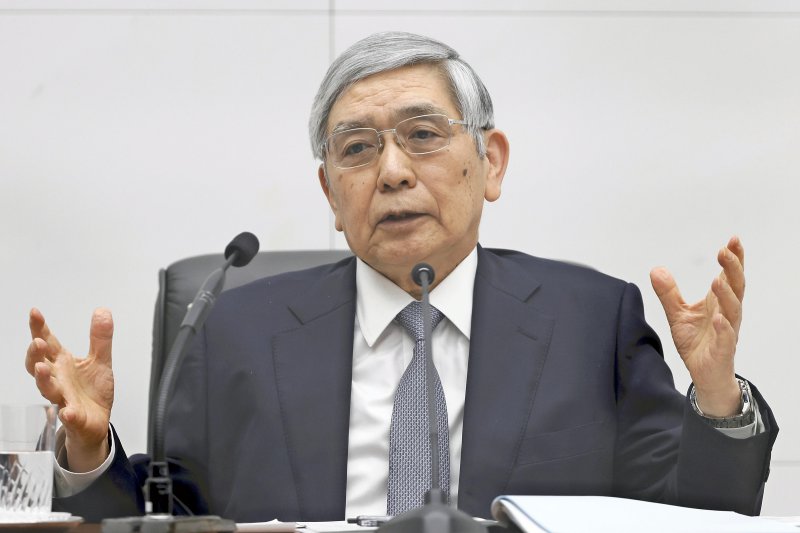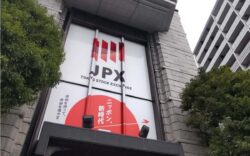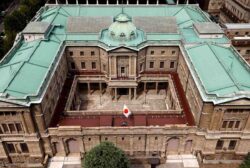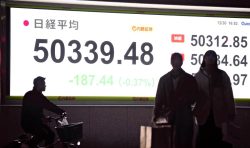
Bank of Japan Gov. Haruhiko Kuroda speaks at a March press conference at the BOJ’s head office in Tokyo, after a policy board meeting.
21:00 JST, April 11, 2022
Bank of Japan Gov. Haruhiko Kuroda had just one year remaining in his term as of Saturday. He intends to continue the central bank’s ultra-easy monetary policy for the rest of his days in office, but the BOJ is under increasing criticism over this stance, as the accelerating decline of the yen against the U.S. dollar may spur price increases.
The prospects for Japan’s economy have become ever more uncertain, partly due to the increasingly tense situation in Ukraine. Kuroda is likely to continue his balancing act of managing the central bank’s monetary policy until his term ends.
Record term in office
“We will persist with our powerful monetary easing, aiming to create a virtuous cycle in which prices and wages rise slowly,” Kuroda said during a question-and-answer session at the House of Representatives Financial Affairs Committee held on April 5, stressing his intention to continue the unusually large-scale monetary easing policy adopted in April 2013, shortly after he assumed his post.
As of September 2021, Kuroda had been in office for a record 3,116 days.
The BOJ advocates continuing its monetary easing until the core consumer price index, excluding volatile fresh food prices, tops 2% growth year-on-year and remains there stably. The index rose only 0.6% in February but had increased for six months in a row, primarily due to increases in the price of gasoline and electricity amid the soaring cost of crude oil and higher food prices.
As the impact of reductions in cell phone charges since last spring will also evaporate in the coming months, Kuroda referred during a press conference held after the bank’s monetary policy meeting in March to the possibility of the price index hitting the 2% inflation mark for the first time in the 10 years since he took office.
No virtuous cycle yet
The BOJ is not in a situation in which it could switch its policy toward credit tightening anytime soon.
“We’re seeing cost-push inflation caused by price increases in international markets,” Kuroda said, expressing his assessment that the nation’s economy has not reached a virtuous cycle in which price increases will boost companies’ profits, leading to higher wages.
There is still a large gap between Japan and other countries. The United States, whose central bank has moved to raise interest rates, has seen inflation exceed 7% from a year earlier.
The gross domestic product during the October-December period last year in the United States was more than 3% greater than during the pre-pandemic period. However, in Japan, the GDP was lower compared with before the pandemic. If Japan implements an interest rate hike as in the United States, where prices and wages have risen markedly, it could stall Japan’s pandemic-battered economy.
Emergency measures
With an eye on the House of Councillors election slated for this summer, Prime Minister Fumio Kishida’s Cabinet has been increasingly concerned about the possible adverse impact of price increases on the economy, as it could negate the benefits of wage hikes, one of the pillars of what Kishida advocates as a “new form of capitalism.”
Kishida values fiscal discipline. “He has not taken a standpoint of vigorously advancing monetary easing,” an official close to Kishida said.
The prime minister held talks with Kuroda at the Prime Minister’s Office in late March, when the yen weakened further against the dollar, hitting the ¥125 level. Amid speculation that the Japanese government and the BOJ took steps to stop the yen from weakening excessively, the yen abruptly swung upward against the dollar.
The government plans to draw up emergency measures to cope with soaring prices this month. The BOJ will hold a meeting on monetary policy on April 27-28 to discuss whether to continue its monetary easing.
A high-ranking government official stressed: “The current price increases are closely linked to the situation in Ukraine, and are not due to any policy mistake by the BOJ. The prime minister is not considering having the monetary policy of the BOJ changed right away.”
Yet, the yen has recently been declining further. Izuru Kato, a chief economist at The Totan Research Co., expressed a current opinion in the exchange market, saying, “If the BOJ does not make some change in its policy and no brakes seem to be put on the yen’s decline, the bank will be pressed to modify its course of action.”
To avert a “bad decline of the yen,” with price increases hanging increasingly heavy on companies and ordinary households, a tug of war among the government, the Bank of Japan, and the market is likely to continue for the time being.
Top Articles in Business
-

Prudential Life Insurance Plans to Fully Compensate for Damages Caused by Fraudulent Actions Without Waiting for Third-Party Committee Review
-

Narita Airport, Startup in Japan Demonstrate Machine to Compress Clothes for Tourists to Prevent People from Abandoning Suitcases
-

JR Tokai, Shizuoka Pref. Agree on Water Resources for Maglev Train Construction
-

Toyota Motor Group Firm to Sell Clean Energy Greenhouses for Strawberries
-

KDDI Opens AI Data Center at Former Sharp Plant in Osaka Prefecture; Facility Will Provide Google’s Gemini AI Model for Domestic Users
JN ACCESS RANKING
-

Japan PM Takaichi’s Cabinet Resigns en Masse
-

Japan Institute to Use Domestic Commercial Optical Lattice Clock to Set Japan Standard Time
-

Israeli Ambassador to Japan Speaks about Japan’s Role in the Reconstruction of Gaza
-

Man Infected with Measles Reportedly Dined at Restaurant in Tokyo Station
-

Man Infected with Measles May Have Come in Contact with Many People in Tokyo, Went to Store, Restaurant Around When Symptoms Emerged
























